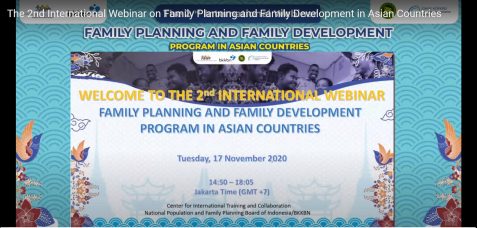Demographic Institute Researcher at The 2nd International Webinar “Family Planning and Family Development Program in Asian Countries”
Depok – (17/11/2020) The National Population and Family Planning Agency (BKKBN) with the support of Partners in Population and Development (PPD), Johns Hopkins Center for Communication Program (JHCCP), and the Commission on Population and Development (POPCOM Philippines), held a webinar on “Family Planning and Family Development Program in Asian Countries” on Tuesday, 17 November 2020. This 2nd International Webinar aims to exchange information, experiences and best practices, including program innovation on Family Planning and Family Development from Indonesia, the Philippines, and China. In this event, two Demographic Institute researchers were also present as resource persons and responders.
Dr. Lilis Heri Mis Cicih, a researcher at the Demographic Institute, Faculty of Economics and Business, Universitas Indonesia, explained the results of a study entitled “Aging Population and Demographic Bonus in Indonesia”. This study aims to observe the characteristics of the elderly and the province according to the ratio of dependents.
The data used comes from the results of field data collection and 2019 susenas. Field data collection is conducted to observe the condition of the elderly during the Covid-19 pandemic. It can be seen that Indonesia’s dependency ratio has reached 46.3%, which means that the productive population bears 46.3% of the unproductive population. The condition of the elderly is still dominated by those with the highest education of primary school (75.94%), the lowest category is 40% (43.84%) and there are 26.7% of elderly who are ill. During the Covid-19 pandemic, the elderly were among those affected by reduced income, health and the risk of death. According to Lilis, the fulfillment of the rights of the elderly needs to be improved along with the increasing number of elderly people in Indonesia.
Prof. Aris Ananta, LD FEB UI Adjunct Researcher as well as President of the Asian Population Association (APA), who was one of the responders at this event, said that the Indonesian population is currently experiencing a digital revolution and a “second demography revolution”. The second demographic revolution in question includes rapid changes in mobility patterns, reduced migration and increased short-term mobility without a fixed pattern, and virtual mobility, where residents can interact with each other virtually without having to physically move.
(am)



